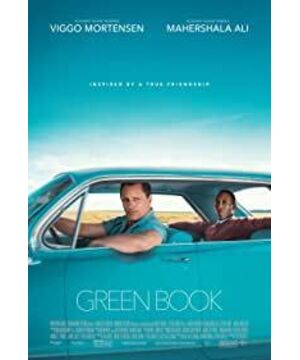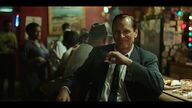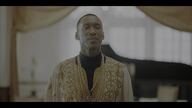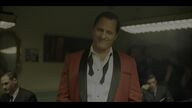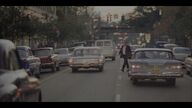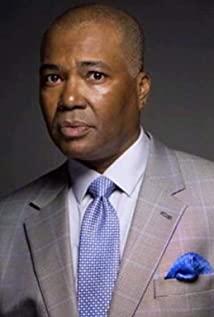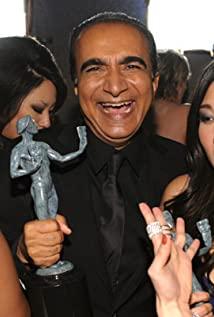The three contradictions between the bottom and the elite, whites and blacks, and heterosexuals and homosexuals are probably the most acute contradictions in the United States in the Trump era. But the "Green Book" is so exquisite that the two people who are burdened by these three contradictions become life friends, which is like a unique love.
The attributes of Dr. Tang and Tony Big Mouth in the three dimensions couldn't be more obvious.
Dimension One First, Dr. Tang is black and Tony is white.
Dr. Tang is one of the world's top pianists with multiple academic qualifications and several foreign languages. He has played twice in the White House within 14 months; while Tony is unemployed and even depends on betting and pawnshops to make a living.
Of course, the "Green Book" not only shows the attributes of the elite and the bottom layer. Dr. Tang is in "the next big game", hoping to improve the status of blacks by touring in the south. This is typical elite thinking. Tony, on the other hand, basically relies on violence and social experience, which is why he was selected by Dr. Tang, and is also a typical low-level attribute.
Dr. Tang is a lot of things, hypocritical, and conceited; Tony is a gambler, loves petty things, and overeats. This is also a typical feature of class attributes.
Dimensional Santang’s graceful gestures, occasional meanness, and later attachment to Tony made him very gay. Tony is a traditional straight Italian man who loves his family, brothers, children, fears his wife, and is tolerant.
The two people with the above three attributes sat in a car and started a two-month journey. The wonderful spark between them is the most interesting part of the movie. So that the movie can be sorted out according to the plot of the romance film:
Stage 1: Compete secretly
Due to the differences in the above three dimensions, the smell of hostility was looming when Dr. Tang and Tony started on the road. Dr. Tang stopped Tony from smoking, and Tony ate Dr. Tang’s burger. Dr. Tang satirized Tony's poor vocabulary, and Tony joked about the cover of Dr. Tang's album "Disobedient Child".
You come and I go between the two sides, it is worthy of each other to capture each other's first city.
Dr. Tang conquered Tony, starting from conquering his ears: it was a beautiful piano sound.
Tony conquered Dr. Tang, starting with conquering his tongue: it was delicious fried chicken.
When they arrived in Kentucky, the two sides no longer had a purely "money" relationship, they had already begun to recognize each other.
Phase 2: Protection and acceptance
Tony rescued Dr. Tang from the bar. Dr. Tang asked Tony to attend the performance and was introduced by his full name. Dr. Tang helped Tony write letters, etc., marking that Dr. Tang and Tony had accepted and helped each other.
The plot also derives a second dimension at this moment: pseudo-substrate.
For example, when Dr. Tang was helping Tony write a letter, both of them said "I love u", although not to each other. Another example is Tony accompany Dr. Tang to a suit shop, as if shopping with his wife. Of course, and at the very beginning, Tony said that Dr. Tang’s "Keep quiet" was like his wife. All of these make two men who are not lovers look like a pair, and it will inevitably make countless rotten girls hooked.
Stage 3: Dissecting
At this stage, the conflicts caused by the class attributes of the two sides are the most intense, but the oriented attributes transform the most intense conflicts into deeper tolerance.
Dr. Tang’s bathroom was arrested and Tony’s tongue was full of flowers, but Dr. Tang believed that Tony’s "low-level practices" deviated from his own "elite" values, and the two sides quarreled. The screenwriter’s genius is reflected at this moment. The screenwriter used Dr. Tang’s phrase "I want you to be by my side when I don’t want to do this" to end the most quarrel.
"This matter" of course refers to Gay's matter. At this time, the two people should both be conscious. Tony later realized that his care and care for Dr. Tang was so considerate; the postdoctoral Tang realized that his attachment to Tony was so deep.
Tony's friends in New York became the catalyst, forcing Dr. Tang to "confess".
Then there was the same thing as the "bathroom" incident, which was the "late night assault on the police" incident.
"Attack on the police late at night" is a repetition of the screenwriter's old tricks. The screenwriter once again tore the class rift between Dr. Tang and Tony, and then used orientation attributes to bridge it. Dr. Tang shouted in the heavy rain, "Maybe I am not black enough, maybe I am not white enough, maybe I am not man enough", making Tony feel distressed, and the antagonistic relationship finally ended.
Stage 4: You jump, I jump
Applying the classic lines of "Titanic", at this stage, Dr. Tang and Tony have basically regarded each other as part of themselves. The most typical case is that Dr. Tang gave up the performance for Tony: because the organizer's manager humiliated Tony. Of course, Dr. Tang drove on a snowy night to send Tony home.
The beginning of the movie is actually very interesting. Tony deliberately used the "hat" incident to shut down the nightclub for rectification. In fact, it has half of the prank attribute, and the other half is Tony's boredom of the "service career". In fact, as a waiter, he more often "serves" the upper-class people. This is why he violently beat up troublemakers in nightclubs, and why he was later unwilling to accept the recommendation of the sheriff.
When Dr. Tang saw Tony being humiliated by the manager, he gave Tony the power of life and death in the performance. Since then, the elite has given up "a big game of chess", and the bottom layer will inevitably not be able to get all the rewards of the record company. Both of them have abandoned their original intentions. The elite and the bottom layer are in love!
Of course, this was not enough. After all, their "love" could not be transformed into a further physiological step, so that in the Orange Bird Bar, Dr. Tang's superb skills made Tony climax, and after he came out, Tony pulled his gun and shot wildly.
Of course, falling in love will make people develop for the better. For example, Tony helped Dr. Tang change his musical attitude, helping him no longer play in a “trained” way, but in a “love” way. After witnessing the suffering of the black compatriots on the road, Dr. Tang began to become willing to play for the public, and he could even play jazz that is not so elegant and has a strong entertaining attribute.
Political attitude
The political attitude of the "Green Paper" is very clear. First of all, the "Green Paper" does not fully approve of the elite's "big chess game", nor does it fully approve of the violence at the bottom, but believes that the political strategies of the elite and the bottom have their own merits and weaknesses. This is why Tony can settle trivial matters, but rely on Dr. Tang for big matters; but when Dr. Tang is killed by trivial matters, Tony protects him well.
Secondly, the most "politically correct" aspect of "Green Book" is that it exposes the hypocrisy of the white upper class: using Dr. Tang's performance to advertise one's taste, but still not treating Dr. Tang as a human being at the end of the song.
Standing in the center of the universe "calling for love"
Oscar prefers to stand at the center of the universe and "call for love" than Chen Ming said. Although the "Green Book" favored by the awards season is based on real events, in real life, blacks and whites, elites and the bottom, gays and straight men, can really "melt" like Dr. Tang and Tony. I'm afraid it's very rare. Therefore, "Green Book" and "Driving for Miss Daisy" are more like a utopia, or a bite of nutritious chicken soup in a muddy world. The latter won the best picture Oscar.
Proposition composition
Regardless of ideology and purely from an artistic point of view, the "Green Book" seems to be too functional. I can't wait for every plot to carry the theme function. Compared with "Unreachable", the "Green Book" is less. One piece is natural.
From the perspective of the camera, in "Unreachable", the black man went to work on his first day, and the director used his back to follow the film. It felt like "Grandma Liu entered the Grand View Garden". The camera and the content complemented each other. In another period, when the black man was driven out of the house by his mother, the camera was gradually shaken, giving a bird's-eye view of the streets of Paris in the morning. The protagonist disappears in the street, and the feeling of being homeless is needless to say. But "Green Book" basically does not have a very commendable lens. Instead, editing played a very crucial role in the "Green Book."
In terms of plot, both "Unreachable" and "Green Book" pay attention to "character arc". The green stone in the "Green Book" was held by Tony and Dr. Tang successively, indicating that Dr. Tang found that the "fun" at the bottom was also very interesting: how good it would be to secretly take the stone from your sweetheart. And Tony went from being insignificant to writing a master.
But when you think about it, Green Stone has nothing to do with the main line of the story. Dr. Tang is going to perform, and the green stone line seems to be added forcibly.
"Unreachable" does not have so many "ambitions." Before driving Maserati for the first time, the black man taught the people who messed up the parking lot. At the end of the movie, black people no longer simply use violence, but begin to communicate. This is a very obvious "character arc", and the parking is closely around the story line, so it does not appear deliberate.
"Unreachable" has an extra subtlety. Until the end, we don't know that the boss has never come out of the pain of losing his wife. The "Green Book" is like a propositional composition with a pre-determined topic, although perfect, it is too sharp.
Perhaps when Dr. Tang and Tony slept in the same room for the first time, Tony’s words made me feel fresh and natural: "Actually, the women in Pittsburgh are not worthy of the name"... Haha, sleep well. Dr. Tang doesn’t know how to eat your tofu!
View more about Green Book reviews


